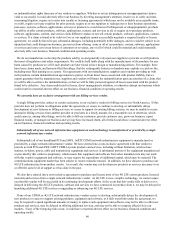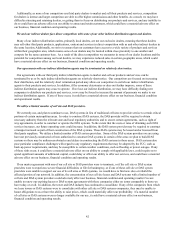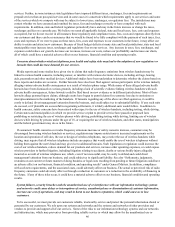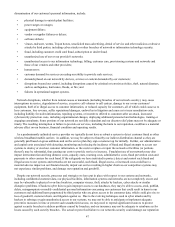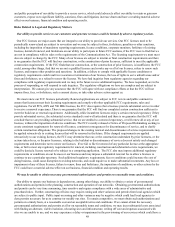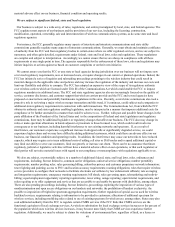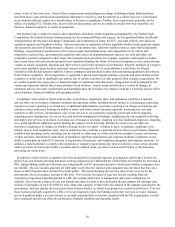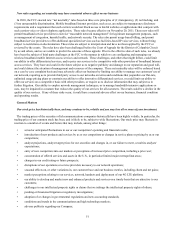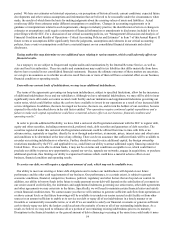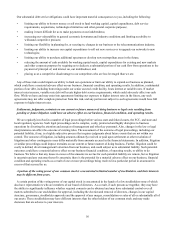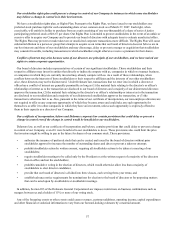Metro PCS 2011 Annual Report Download - page 58
Download and view the complete annual report
Please find page 58 of the 2011 Metro PCS annual report below. You can navigate through the pages in the report by either clicking on the pages listed below, or by using the keyword search tool below to find specific information within the annual report.47
dissemination of our customer's personal information, include:
• physical damage to outside plant facilities;
• power surges or outages;
• equipment failure;
• vendor or supplier failures or delays;
• software defects;
• viruses, malware, worms, Trojan horses, unsolicited mass advertising, denial of service and other malicious or abusive
attacks by third parties, including cyber attacks or other breaches of network or information technology security;
• fraud, including customer credit card fraud, subscription or dealer fraud;
• unauthorized use of our or our provider's networks;
• unauthorized access to our information technology, billing, customer care, provisioning systems and networks and
those of our vendors and other providers;
• human error;
• customer demand for services exceeding our ability to provide such services;
• demands placed on our network by devices, services or content demanded by our customers;
• disruptions beyond our control, including disruptions caused by criminal or terrorist activities, theft, natural disasters,
such as earthquakes, hurricanes, floods, or fire; and
• failures in operational support systems.
Network disruptions, whether from natural causes or manmade (including breaches of our network security), may cause
interruptions in service, degradation of service, excessive call volumes to call centers, damage to our or our customers'
equipment, theft of or illegal access to customer information, or reduced capacity for customers, all of which could cause us to
lose customers, lose revenue, suffer reputational damages, embroil us in litigation and cause us to incur remediation costs,
including liability for stolen information, repairing systems, or incentives offered to customers after an attack, increased
cybersecurity protection costs, including organizational changes, deploying additional personnel and technologies, training or
engaging consultants. Some portions of our network are not fully redundant and our disaster relief plans may not be adequate or
timely. The resulting interruption or failure to provide our services, including the harm to our reputation, could have a material
adverse effect on our business, financial condition and operating results.
As a predominantly unlimited service provider we typically do not have as robust a system to detect customer fraud as other
wireless broadband mobile carriers. In addition, we may be subject to fraud by our indirect distribution channel as they are
generally paid based on gross additions and on the service plan they sign a customer up for initially. Further, our administrative
and capital costs associated with detecting, monitoring and reducing the incidence of fraud and illegal attempts to access our
systems to destroy or steal our customer information, or the costs to replace or repair the network or facilities (or portions
thereof), may be substantial, thus causing our costs to provide service to increase. Fraudulent use of our networks may also
impact interconnection and long distance costs, capacity costs, roaming costs, administrative costs, fraud prevention costs and
payments to other carriers for such fraud. If the safeguards we have instituted to protect, detect and control such fraud and
illegal access to our systems and networks are not successful, such fraud, illegal access, or increased costs could have a
material adverse impact on our financial results, impair our service resulting in higher churn as our competitors systems may
not experience similar problems, and damage our reputation and goodwill.
Despite our network security, processes and strategies we have put in place with respect to our systems and networks,
including confidential customer data, our physical facilities, information systems and networks are not completely secure and
may be vulnerable to physical or on-line break-ins, computer viruses, theft, attacks by hackers, cyber attacks or similar
disruptive problems. If hackers/cyber thieves gain improper access to our databases, they may be able to access, steal, publish,
delete, misappropriate or modify confidential personal information concerning our customers that could result in harm to our
customers and additional harm perpetrated by third parties who are given access to the consumer data, which could give rise to
loss of goodwill, customer churn, and litigation against us. Due to the evolving techniques used in cyber attacks and by
hackers to sabotage or gain unauthorized access to our systems, we may not be able to anticipate or implement adequate
preventive measures in time or prevent such unauthorized access, we may need to expend significant resources to protect
against security breaches to address problems caused by breaches, and our insurance may not be adequate to reimburse us for
losses caused by such security breaches. The actual or perceived failure to our networks security could damage our reputation





